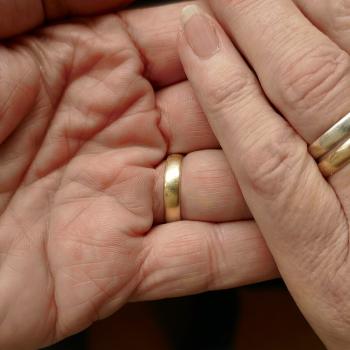Yesterday I wrote this, and you might be wondering why:
You can talk to an officer at your local police station and describe the situation first before naming the perpetrator, if you are unsure whether a crime is actually taking place.
Isn’t it obvious if sexual abuse is taking place? The answer is no, not always. Today we’re going to look at why that is, and why you should go ahead and make an inquiry with the police about a questionable situation if you’re unsure.
(And no, this isn’t police-state scare tactics.)
Let’s begin by reviewing the layers of safety net we put in place to prevent and stop sexual abuse in an organization such as your parish or youth group:
1. Don’t allow criminals in. This is what your background checks are for.
2. Don’t make it easy for crimes to occur. This is why you have the “two unrelated adults rule” — whether for counting the collection or collecting the children. Remember that every convicted embezzler or sex offender was able to pass a background check until that first conviction.
3. Intervene when people do stupid stuff. When Mr. Jarvis forgets to lock the poor box or Mrs. Alvarez says she can manage the nursery all by herself, there’s probably nothing bad happening, just stupid. You step in and rectify the situation to get yourself back to step 2, making it difficult for crimes to occur. Lock the box; tell Mrs. Alvarez you’ll stay on site until the other volunteers show up.
4. Stop criminal behavior as soon as it occurs. You don’t watch and wait when money starts going missing. You don’t watch and wait and when children start being abused.
The difficulty with #4 is today’s topic: Early crime isn’t always obvious crime. Successful criminals will specifically try to make it look as if no crime occurred. In theft: “We’re just a few dollars short — probably a mix-up.” In sexual abuse, it is very common for early molestation to be passed off as “normal” behavior, even though it isn’t.
This is why you may very well find yourself in a situation where you suspect something’s not right, but you might not be completely sure whether a crime took place. Let’s look at some scenarios.
Note: This is where I start describing incidents of sexual molestation. Some readers who’ve already been-there-had-that-done-to-me might want to click elsewhere now.
***
I’m running these in pairs of “my child said” stories, so you can see how the normal incident compares to the molestation scenario.
Scene A: “Today at VBS was Water Wednesday. We all changed into our swimsuits, and you know Dana O’Conner? She’s kind of, you know, um, grown, or something, and her swimsuit was totally showing EVERYTHING. So when Mrs. Heimer saw that, she quick ran and got the VBS t-shirts from the box in the office, even though we’re not supposed to get them until the thing for the parents on Friday, and she made all the fifth graders put on their t-shirts before they did the water balloons. So that’s why I have my t-shirt early and it’s wet and I have to bring it back Friday. The fourth graders wanted their t-shirts, too, but Mrs. Heimer told them no, only fifth graders needed them early.”
Scene B: “Today at VBS was Water Wednesday. We all changed into our swimsuits, and then Mrs. Sorenson said that she needed to check to make sure they fit right. And so she had our group line up on that wall by the door, and you could hear the other groups going outside but you couldn’t see them because where we were you couldn’t see the door, and she was running her hands down the straps and also down the edge by my butt and stuff, and she said my swimsuit needed an adjustment and I was like, ‘I can fix it myself,’ and she’s like, ‘no, an adult has to do it, and if you don’t cooperate you won’t get to do the water balloons.’ So I didn’t know what to do, and then Mrs. Heimer came to see why our group wasn’t out on the field yet and Mrs. Sorenson stood up real fast and she said that we were all ready to go.”
Scene A: “It was game time and our group was in the youth room and most of the kids were just playing Foosball, or watching, but George was getting into the closet and he found Twister and he asked if we could play that, and Jeannie and Mark our group leaders said we could. But then Cara Mosely kept saying she was stuck and Jeannie had to rescue her, and at first Jeannie would go like pull her out, but then she figured out Cara was just doing it for attention, and that’s when Mr. Hendrix came back from looking for the lost basketball and he said we should play Saint Bingo like we’re supposed to, and Jeannie was really relieved, because she’s nice but she’s kind of stupid about Cara, you know? I think Mr. Hendrix took the Twister game to the office later and I don’t think the youth are allowed to play it either.”
Scene B: “It was game time and our group was in the youth room and most of the kids were just playing Foosball, or watching, but George was getting into the closet and he found Twister and he asked if we could play that, and Jeannie and Mark our group leaders said we could. And then Mark kept saying he was the referee and it was his job to make sure everyone was in a safe position, and he kept having to move me and Cara Mosely around, and he’s like putting his hand you know, right between my legs? And I’m like, ‘I don’t need you to move me around,’ And he’s like, ‘It’s my job to keep you safe so you have to let me,’ but he never did that to George. And then Jeannie came over and he quit moving us around, and then Mr. Hendrix came back and made us stop and playing altogether, but I don’t think Jeannie told him what Mark was doing, I’m not sure if she saw or not.”
Scene A: “So my new sneakers were bugging me so I took them off on the playground and put them someplace where I wouldn’t forget them, but then when our recess was over, I couldn’t remember where I put them, so I looked for them and then Ms. Becca’s like, ‘We can’t look all day, just walk real carefully, and I’ll look around for them while you’re in class.’ And that was no big deal until last period when our group was in the music room and Ben Parker’s like throwing spitballs and stuff and Mrs. Vanderbeld finally gives up on teaching us, ‘Love Love Love My Bible Adventure’ and Nathan our group leader says, ‘What if we just go out to the basketball court and play tag?’ and Mrs. Vanderbeld’s like, ‘Good idea,’ so they take us out. And I wanted to play so I didn’t say anything to Mrs. Vanderbeld or Nathan and I guess they forgot I didn’t have shoes, and I was this close to catching Ben Parker and then I tripped on that line where the grass is growing in in the middle of the court, and that’s how I cut my knee and scraped up my feet, and they wouldn’t let me play after that. And then I was in the office getting a band-aid when Mr. Hansen came in with my sneakers and he said he found them in that little ledge under the slide, which is where I put them so I wouldn’t forget them.”
Scene B: “So I tripped while I was playing tag and got scraped up, and I was like, ‘I’m fine I can keep playing,’ and I really would have caught Ben Parker if they hadn’t made me quit, but Mrs. Vanderbeld made Nathan take to me to the office. And Ms. Becca’s like, ‘Thanks, you can go now, Nathan,’ and then she shuts the door to the office and she says, ‘I need to clean your cuts,’ and she takes me to her private bathroom in her office and she’s like doing everything for me like I’m a baby and at first I’m like ‘whatever’ but then she keeps touching my feet and touching my feet and then she’s like, ‘I need to check and make sure you don’t have any other injuries,’ and she’s checking me everywhere, I mean everywhere, even though it was only my knee and my foot, and I’m like, ‘I think I’m okay,’ and she’s like, ‘no, I have to make sure you’re safe,’ and she’s like checking up my shorts and things and saying ‘you might have hurt yourself there so you have to let me look,’ and then Mr. Hansen knocks on the office door and he has my shoes and Ms. Becca’s like, ‘He cut his knee,’ and she quick puts a band-aid on my knee even though it probably didn’t need it, and I put on my shoes and go.”
***
If one of the Scene B situations happens to someone you know, you’ll be lucky to get as much information from the child as what’s in the monologue. It’s fairly likely the victim won’t be fully sure how serious a situation it was, even if he or she is very disturbed by what happened. Criminal sexual molestation can include situations such as these where there is no genital contact, no pornography, no sexually-themed conversation, no genital exposure of either the perpetrator or the victim.
One of the goals of a skilled sexual predator is to operate for as long as possible in the zone where it’s still possible to explain away the molestation.
If someone is intentionally engaging in this kind of molestation, it isn’t an accident. Intentional molestation is not a crime of desperation — no one “needs” to feel another person’s groin they way you might, say, in the face of starvation steal a loaf of bread. Someone who is acting on a sexual urge towards minors (or acting on any sexual urge without the consent of his or her partner) is a dangerous, predatory criminal.
Given scanty information and perhaps a charitable bent, maybe you are thinking that what happened was just a lapse of judgement or an accident. So phone the police. Say, “I’m not sure what my child told me about is a crime or not. Her teacher was putting her hands on my child’s breast and groin, and here are the circumstances. Does that sound like an accident or a mistake, or was it abuse?” Ask to speak to someone who has handled a number of these cases in the past. Ask for guidance on what questions to ask your child in order to elicit more information without giving leading questions. Ask for advice on how to tell the difference between an innocent Scene A and a criminal Scene B.
But you need to call the police. Not your friend from church. Not your neighbor whose kid is a fireman. Not your boss. Not your bishop. When there is reasonable suspicion of dangerous criminal activity, and that’s exactly what all these Scene B’s are, if you actually want to stop that activity, you call the police.
Photo: By Uoaei1 (Own work) [CC BY-SA 3.0 at], via Wikimedia Commons













